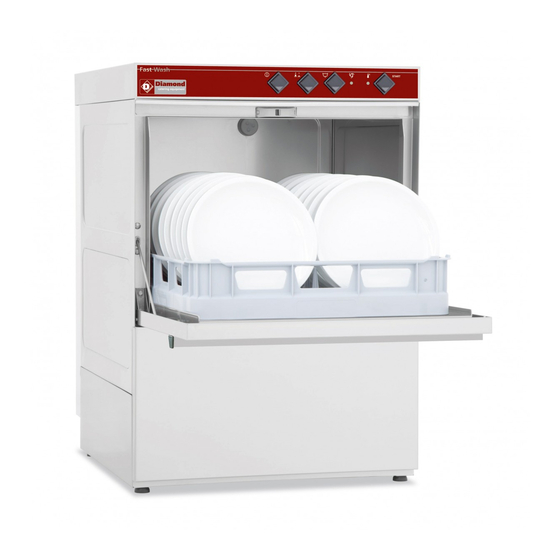Diamond 916317 Manual - Halaman 4
Jelajahi secara online atau unduh pdf Manual untuk Peralatan Makanan Komersial Diamond 916317. Diamond 916317 13 halaman.

INSTRUCTION MANUAL FOR DISHWASHERS
•
•
•
•
•
•
•
•
•
•
•
The power line, which must be H07RN-F unit, must not be stretched or crushed during normal
operation or maintenance.
•
The appliance must also be connected to an equipotential system with the screw marked with the
symbol.
•
The equipotential cable must have a cross section of 10 mm².
•
Respect the polarities indicated in the wiring diagram.
•
For further information, refer to the wiring diagram.
Do not use multi-sockets, adapters, cables of an inadequate cross section or type or
with extensions not conforming to established electrical installation regulations.
Check that there are no objects or materials in the installation area which may
be damaged by the steam emitted by the appliance during operation, or if there
are, make sure they are properly protected.
Before positioning the appliance, set up the electrical power supply, water
supply and drain connections
The floor or build-in unit must be rated to support the weight of the appliance
To ensure that it is stable, level the appliance with its four feet.
The appliance is intended for fixed installation only; any other approaches must
be agreed with and approved by the manufacturer.
Remove the protective film from its body panels before operating the
dishwasher.
The power supply must be fitted with a omnipolar circuit breaker (master power
switch) to break all contacts including neutral, with a contact gap of at least 3
mm and thermal cutout or fuses, which must be set or rated to the power
indicated on the machine's nameplate.
The master power switch must be fitted to the power line in the vicinity of the
installation and may be connected to only one machine at a time.
The mains voltage and frequency must match the nameplate ratings.
The installation must include a grounding system conforming with established
electrical safety legislation, to protect the operator and the appliance itself
2.2 Positioning
2.3 Electrical connection
Page 3 of 10
UK
